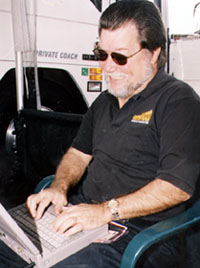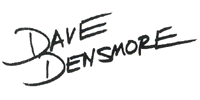|
|
|
|||
|
|
|
|
||

We are a society obsessed with speed. High speed internet access. Warp speed. Speed trap. Speed shops. Speed merchants. Full speed ahead. However, nowhere is speed more exalted than it is in motor racing. Speed Weeks, Dallas Motor Speedway, Bristol Motor Speedway, the World Center of Speed. There's National Speed Sport News and Speedvision. Speed Freaks is the title of Kenny Sargent's motorsports-based radio show. Speed Racer was the name of a racing-themed animated kids show. Once they're in front of a television camera, racers in all forms of motorsport apparently feel it necessary to remind us that they are driven by the "need for speed." In Winston Cup, the CART series, the IRL series, Trans-Am, World of Outlaws, even the Saturday night late model races at Anywhere, USA, speed is a tangible commodity. The fastest car is going to start on the "pole" and, everything else being equal, the fastest cars and drivers are going to race to the checkered flag. If Bobby Labonte clocks a 201.10 mile per hour qualifying lap at Talladega Superspeedway and brother Terry does only 198.50, every layman knows that Bobby is going to start the race ahead of his older sibling. That's true of every motor sport, save one. In every discipline in which the race starts and ends at the same spot, one easily can explain the relationship of speed to performance. Speed, in fact, is performance. Lap times are quickly and easily converted to lap speeds. Forty five seconds around a 2.5-mile oval is 200 mph. The only exception to that rule is drag racing where the finish line is 1,320 feet removed from the starting line. In drag racing, speed is irrelevant. At least that's what we in the sport like to tell peopleFor instance, casual fans not familiar with our sport might have been confused by the Funny Car final at last week's Lucas Oil Products Nationals at Route 66 Raceway. Why? Well, John Force was clocked at 321.19 mph in his Castrol GTX Ford but Del Worsham was the Funny Car champion even though his Checker/Schuck's/Kragen Pontiac ran "only" 314.39 mph. "Oh, speed means nothing in drag racing," we say. "Elapsed time is the operative statistic." As if that solves everything. Of course, we aren't at all shy about hyping speed when it is to our benefit. Tony Pedregon's 324.83 mph Funny Car speed and Mike Dunn's 331.53 mph Top Fuel speed were the "hooks" for the media at the Advance Auto Parts Nationals at Heartland Park-Topeka. We tout "330 Mile-An-Hour Top Fuel Dragsters" in TV and radio ads. We hype the "King of Speed." We promote our hybrid vehicles as the fastest race cars on the planet. Then we stammer and stutter and offer up our "speed is irrelevant" excuse when asked to explain how Joe Hartley ran 4.888 at only 234.25 mph and qualified ahead of Chris Karamesines, who ran 301.33 mph. If speed indeed is irrelevant, why don't we just eliminate it as a statistic? That would avoid considerable confusion in a sport badly in need of a makeover. Or, we could fall into line with EVERY other motor sport and compute speeds by lap times. In our case, a 4.50 second quarter mile would equal a speed of 200 mph. No more having to defend our numbers, no more having to explain the speed trap. No more "speed is irrelevant." But we can't do that, can we? Drag racing without those unique speed numbers is like nachos without jalapenos. No spice. Of all the motor sports, ours is the one that is speed-driven. An average speed number like those developed in Winston Cup not only wouldn't be very impressive, it also would not accurately portray the sport. Ours is an acceleration sport and speed is the essence of acceleration. Zero to 331.53 miles per hour in 4.5 seconds? Exciting. Four-point-five-oh seconds, or 200 miles per hour? Booooring. The point is this, if we are going to continue to hype high speed, then let's quit apologizing for it. Let's face the issue head on and educate people about the difference in acceleration speed and average speed and let's quit making apologies because we go fast. There was a time when the NHRA paid cash and points bonuses for quick time and top speed of the meet. There was a time when a driver like Mike Dunn, who set an NHRA national speed record, earned 20 bonus points, the same number awarded those who set an official e.t. record. National record and event bonuses were eliminated when the NHRA decided, for safety's sake, to de-emphasize speed as a means of, perhaps, keeping speeds below 300 miles an hour. Given the nature of drag racers, it was an initiative that was doomed to failure. Subsequently, the NHRA opted to improve the safety not only of its race cars but of its race tracks to the extent that today, Top Fuel racing is much safer at 320 mph than it was at, say, 290. But we still treat speed like the ugly stepchild. Face it, speed sells. But if we're going to use the performances of racers like Dunn and, before him, Tony Schumacher to promote the sport, let's give 'em a little more than just an attaboy. At the very least, let's reinstate the national record points for top speed and pay a bonus, even if its just one point, to the fastest in each pro class and each national event. Let's take hypocrisy out of the equation. If speed really doesn't matter, then let's quit hyping it. If it does matter, then let's create some proper rewards for those who excel.
Dave Densmore, a paid columnist for DRO, also works for John Force. Photo of Densmore by Jeff Burk
|
||||
|
Copyright 1999-2001, Drag Racing Online and Racing Net Source |
||||





